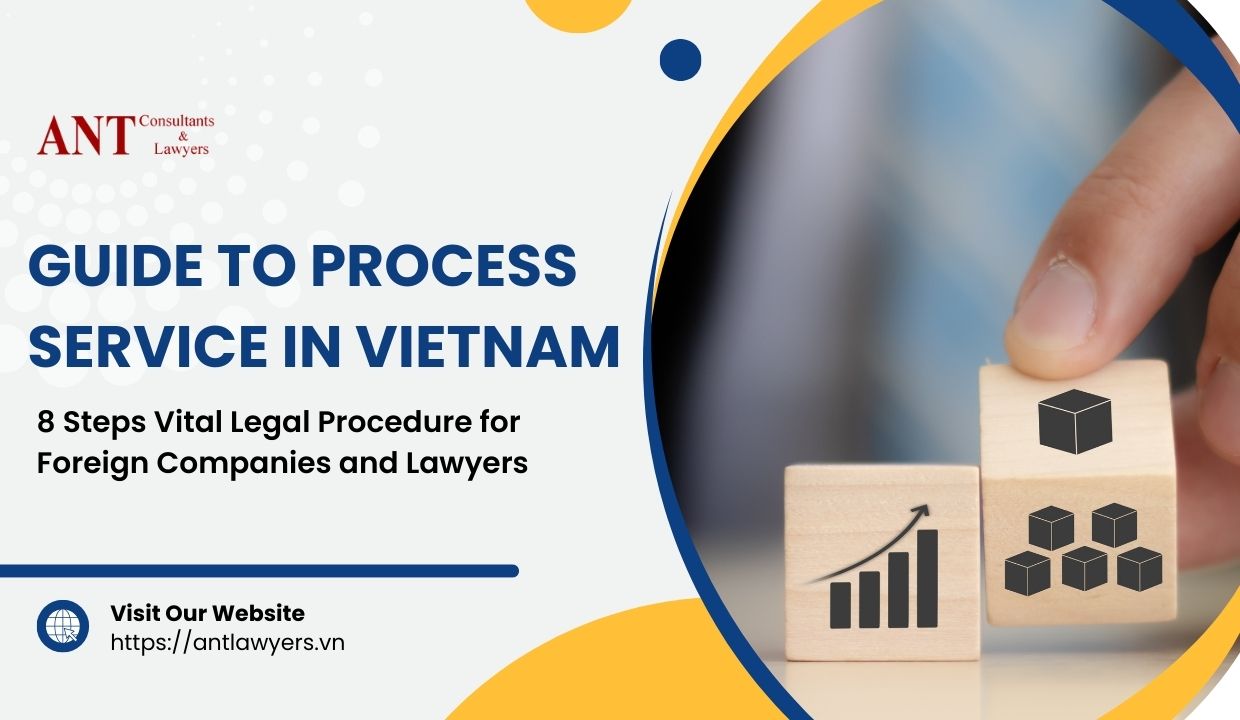For foreign companies, international law firms, and foreign lawyers representing clients in disputes involving individuals or businesses in Vietnam, understanding process service in Vietnam is essential.
Vietnam’s legal system has strict requirements for notifying defendants and other involved parties, and failure to comply with these regulations can lead to case delays or even dismissal. Foreign litigants often encounter challenges related to language barriers, different legal procedures, and enforcement mechanisms, making a thorough understanding of process service crucial for effective case management.
In here, we discuss the process service system in Vietnam, including legal requirements, practical challenges, and strategic considerations for foreign entities.

What is Process Service in Vietnam?
Process service in Vietnam refers to the formal delivery of legal documents such as summonses, complaints, judgments, and other notices to individuals or entities involved in a dispute.
In international legal matters, foreign plaintiffs and law firms must ensure that Vietnamese parties receive proper legal notice in accordance with Vietnam’s laws. Without proper process service, courts in Vietnam may refuse to hear a case, delay proceedings, or reject foreign judgments due to procedural violations.
This is particularly important for:
- Commercial disputes involving contracts, investments, or transactions in Vietnam.
- Debt recovery cases against Vietnamese individuals or businesses.
- Intellectual property enforcement where a Vietnamese entity is infringing on a foreign company’s rights.
- Family law disputes involving foreign nationals and Vietnamese citizens.
Where Does Process Service Take Place in Vietnam?
For foreign litigants, knowing where process service can legally occur is essential to ensuring compliance. Documents must be served at locations where the recipient is reasonably expected to be found, such as:
- Residential Addresses: If the defendant is an individual, documents should be delivered to their registered home address.
- Business or Corporate Offices: If the recipient is a company, process service is typically conducted at its registered business address.
- Local Authorities: If a recipient is unavailable, courts may instruct local People’s Committees to accept the documents.
- Public Notice and Newspapers: If the recipient cannot be located, courts may issue public notices in official publications or online legal bulletins.
Foreign entities must ensure that documents are properly addressed, as incorrect or outdated addresses may lead to service failure and case delays.
When is Process Service Required in Vietnam?
Foreign companies and legal practitioners should be aware that process service in Vietnam is required at multiple stages of litigation:
a) Initiating a Lawsuit Against a Vietnamese Party
- Before a case can proceed, the defendant must be properly notified of the lawsuit.
- If process service is not correctly conducted, the Vietnamese court may decline jurisdiction over the case.
b) Summoning Witnesses or Experts
- If foreign plaintiffs require Vietnamese witnesses or experts, formal service of summons is required to ensure court compliance.
c) Notifying Parties of Court Rulings
- After a court issues a ruling, all involved parties must be officially served with the decision.
- This is particularly relevant for foreign plaintiffs who wish to enforce a judgment in Vietnam.
d) Enforcing Foreign Court Judgments in Vietnam
- If a foreign company has won a case abroad and seeks to enforce the judgment in Vietnam, proof of proper process service in the original case is required.
- Vietnamese courts may refuse to recognize foreign judgments if the defendant was not properly served in compliance with Vietnamese legal standards.
Why is Process Service Critical for Foreign Entities in Vietnam?
Foreign businesses and law firms must take process service seriously when litigating in Vietnam due to the following reasons:
- Ensuring Due Process: Vietnamese courts strictly require proof that all parties have been properly notified.
- Avoiding Case Dismissals: A lawsuit filed by a foreign company may be dismissed if service is not correctly performed.
- Preventing Delays: Improper service can result in months-long delays, particularly if a case requires multiple service attempts.
- Enhancing Enforceability: Proper process service increases the likelihood that a foreign judgment or arbitral award will be recognized in Vietnam.
Foreign litigants should work with Vietnamese legal professionals to ensure compliance with local court requirements when serving documents.
How is Process Service Conducted in Vietnam?
Vietnamese law provides several methods for process service, each with specific procedures that foreign parties must adhere to:
a) Personal Service (Direct Delivery to the Defendant)
- The most effective method, ensuring the recipient physically receives the documents.
- The recipient must sign an acknowledgment of receipt, which is submitted to the court as proof of service.
b) Substituted Service (Delivery to a Third Party)
- If the recipient is unavailable, the documents may be given to a family member, business partner, or local authority.
- This must be done in compliance with Vietnamese law, as not all third parties can legally accept service.
c) Service by Registered Mail
- Common for commercial disputes, this method requires sending documents via registered mail with acknowledgment of receipt.
- Courts may reject mail service if there is no confirmation of receipt.
d) Public Notice or Newspaper Publication
- If a Vietnamese defendant cannot be located, courts may allow service through publication in official newspapers or online legal portals.
- This is a last resort and typically used when defendants actively evade service.
Foreign companies must ensure that process service follows Vietnam’s legal standards to avoid procedural challenges in court.
Challenges Foreign Entities Face in Process Service in Vietnam
Foreign businesses and law firms frequently encounter several obstacles when trying to serve legal documents in Vietnam:
a) Defendants Evading Service
- Some Vietnamese defendants actively avoid receiving documents, making it difficult to complete service.
- In such cases, public notice service or alternative legal mechanisms may be required.
b) Language Barriers
- Legal documents must be translated into Vietnamese to be legally valid.
- Failure to provide an accurate Vietnamese translation may result in service being considered invalid by the court.
c) Address Inaccuracies
- Many companies and individuals in Vietnam do not update their legal addresses, causing delays in locating the recipient.
d) Postal and Administrative Delays
- Vietnamese postal and legal systems may take weeks or even months to complete service, especially in rural or remote areas.
Foreign entities should work with local attorneys or legal service providers to mitigate these challenges and ensure process service in Vietnam is conducted efficiently.
Strategic Considerations for Foreign Companies and Law Firms
To navigate Vietnam’s process service regulations effectively, foreign litigants should:
- Verify the recipient’s address before initiating service to avoid unnecessary delays.
- Use professional legal service providers to ensure compliance with Vietnamese law.
- Consider alternative service methods, such as bailiff service, to improve efficiency.
- Ensure proper Vietnamese translation of all legal documents before service.
- Work with local legal experts to avoid procedural mistakes that could invalidate the case.
Conclusion: Ensuring Effective Process Service in Vietnam for Foreign Litigants
For foreign companies and law firms, understanding and complying with process service in Vietnam is critical for success in legal disputes. Whether initiating litigation, summoning witnesses, or enforcing a foreign judgment, proper service is essential to ensuring fair and efficient legal proceedings.
Given the complexities involved, foreign litigants should engage local legal counsel to navigate the Vietnamese legal system, avoid procedural errors, and maximize their chances of a favorable outcome.
If you need assistance with process service in Vietnam, consulting a Vietnamese dispute resolution lawyer is the best way to ensure compliance and protect your legal interests.
About ANT Lawyers, a Law Firm in Vietnam
We help clients overcome cultural barriers and achieve their strategic and financial outcomes, while ensuring the best interest rate protection, risk mitigation and regulatory compliance. ANT lawyers has lawyers in Ho Chi Minh city, Hanoi, and Danang, and will help customers in doing business in Vietnam.
How ANT Lawyers Could Help Your Business?
Please click here to learn more about ANT Lawyers or contact our lawyers in Vietnam for advice via email ant@antlawyers.vn or call our office at +84 28 730 86 529




